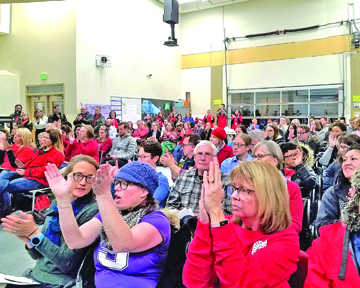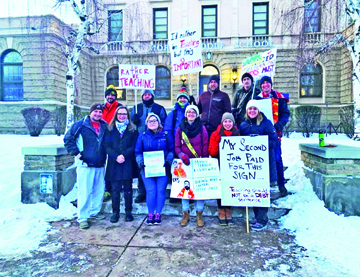by Ruthy Wexler

The Denver teacher strike made national headlines as the latest district to join the Red4Ed movement on February 11. The strike ended three days later when the Denver Classroom Teachers Association (DCTA) and officials representing the Denver public school system (DPS) signed a tentative agreement. Denver wasn’t the longest strike — Los Angeles held out for five days, West Virginia for nine — but it stood out in another way. “You are a little bit unique here in Denver,” said National Education Association President Lily Eskelsen Garcia, alluding to the controversial pay system known as ProComp. Why ProComp, originally liked by teachers, now caused teachers such distress — why the once-popular pay-for-performance system caused Denver teachers to upend the lives of 72,000 students, put their own livelihoods at risk and enter the first strike in 25 years — is a layered story that goes back 15 years.
Disrespected
Denver educators were also protesting the same issues that caused red-shirted educators to stand up in Oklahoma and Arizona: excessive emphasis on standardized testing, smaller class size, and pay they considered a living wage. At demonstrations, many teachers carried this sign: “When we can’t afford to strike, that’s when we have to strike.”
Newly appointed DPS Superintendent Susana Cordova let her feelings be known: the strike could be avoided if “we sat down and engaged in a discussion that found our common values and beliefs.” But the 93% of DCTA educators who voted on January 22 to strike disagreed. They believed that each succeeding proposal the district offered showed they weren’t really hearing teachers’ demands, or feelings.
And the way DPS prepared for the strike — hiring more substitute teachers, arranging to pay subs twice their usual rate, spending $137,000 on lesson plans for those subs — revealed teachers’ main concern, that DPS does not regard classroom teachers as valuable professionals. That concern was amplified when a week before the strike, a leaked document, posted online, showed how top heavy the DPS payroll was with administrative positions and how many administrators received bonuses on top of six-figure salaries.

DPS hoped Colorado’s new governor, Jared Polis, would accede to their request and intervene. But on February 7, Polis announced the two sides should work it out themselves, seeing as how their differences were “minor, small … limited.”
Negotiations for those “minor” differences could be seen online. Residents following the bargaining talks on Saturday, February 9 and Sunday, February 10, heard hours of haggling about what a PDU (Professional Development Unit) would be worth — but the talks always circled back to ProComp.
What Exactly Is ProComp?
ProComp — Professional Compensation — is a system that came into being in November 2005, when voters approved a $25 million mill levy override to provide incentives to teachers who worked in “hard to serve” schools. DCTA and DPS jointly designed the system, which was implemented in January 2006, with a stipulation that both parties could revisit the contract in 2007.
Late in 2007, DPS did want to make changes; reluctantly, teachers came to the bargaining table. But after months of fruitless discussions, then DPS Superintendent Michael Bennet issued an ultimatum: teachers should accept the district proposal — higher bonuses and lower base pay — or DPS would no longer honor the master agreement. The ProComp contract was revised early in 2008.
When the ProComp agreement expired in 2013, DPS asked teachers to put off negotiating a new one; they were about to conduct studies on ProComp’s efficacy. Between 2013 and 2017, DPS made changes to ProComp that teachers did not like: “Hard to serve” schools shifting categories; teacher evaluations based on students’ standardized scores; how paychecks had become impenetrably confusing and distressingly unpredictable. “I never know how much money I’ll have for the month,” said a high school English teacher.
DCTA President Henry Roman kept saying that the short-term bonuses were “shortchanging our students. … Teachers deserve a professional career salary.”
What Lies Underneath
The shape ProComp took reflected the reform educational measures DPS Superintendent Tom Boasberg (2008-2018) installed. But ProComp’s changing parameters mostly stemmed from something that happened 15 years before, when Michael Bennet was DPS Superintendent and Boasberg his Chief Operating Officer.
Both men came from the business world and were considered to be financial wizards. Together, they developed a plan to purportedly save DPS millions. They would borrow $750 million for DPS’s outstanding pension debt. Three hundred million would go to pay back already existing pension debt; $400 million would go to fully fund the DPS retirement fund and $50 million would pay banker and lawyer fees.
And although there were indications something was happening in the world financial markets at that time, Bennet and Boasberg went ahead with their plan, which ultimately included institutions such as Goldman Sachs, JPMorgan, Citibank, Wells Fargo and Bank of America, in April 2008. DPS hoped this plan would allow their retirement fund to join the statewide retirement fund, which would in turn allow DPS employees to easily move in and out of the system, which would reduce DPS’s retirement debt — which would provide more money for classrooms. Win/win, right?
Pensions And ProComp
By 2018, that $750 million loan had doubled. DPS now owed $1.8 billion.
Boasberg and Bennet were able to convince the Colorado legislature that DPS should get the equivalent of “pre-payment” credit to deduct the ProComp’s fees and interest from what would have been their normal pension contributions,” explains Jeannie Kaplan, BOE member at that time and unofficial DPS historian. “Because of these actions DPS employees saw their pension fund drop from fully funded on January 1, 2010, to a little under 80% funded in June 30, 2018.”
How the above connects to 2019 teacher strike: base salaries — which ProComp was originally designed to boost — are pensionable. In 2008, the ProComp “bonus” went from a base building system to bonus-based — and since these bonuses do not contribute to a teacher’s pensionable income, this diminishes the amount a teacher has in retirement, and makes smaller demands on a dwindling pension fund.
By 2019, many educators were fed up with ProComp. As the district offered proposals that didn’t address their demands, many wondered who was making decisions for DPS. “Cordova is not the full boss but she definitely has a say,” said one teacher, while educational activists cited DPS Chief Financial Officer Mark Ferrendino and BOE President Anne Rowe, long affiliated with reform groups such as A+ Colorado — and they were heard to say during a closed-door session, “Do not give in to the teachers — as influential.”
Agreement
In the end, DPS did “give in to the teachers.”
“This [February 14] agreement is a win, pure and simple,” said DCTA President Roman. To get that win, Rob Gould, chief union negotiator, said, “I had to use the last tool in my toolbelt.” The agreement provides a more traditional pay system, significant pay raises, a transparent 20-step salary schedule including a 7 to 11 percent increase in base pay — and still keeps incentives for teachers at high poverty schools. Part of the money for teacher raises, said CFO Ferrandino, will come from cutting administrative costs, including 150 central office positions.
For well over a year, DCTA had been trying to negotiate the above points. “For 15 months, the district chose to ignore us,” said Denver teacher Rachel Sandoval. “Can you hear us now?”
